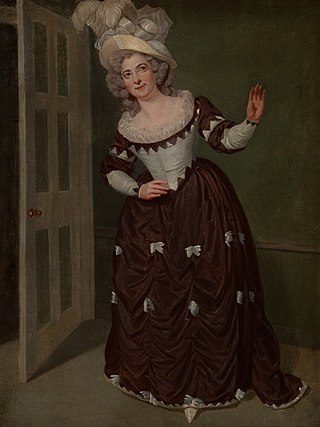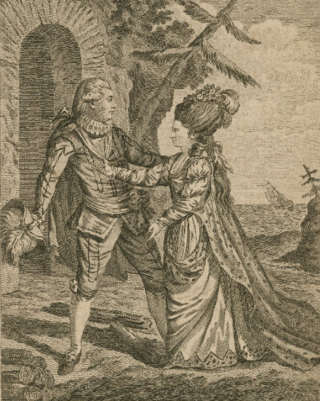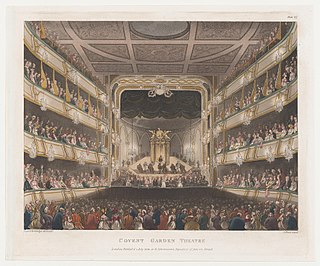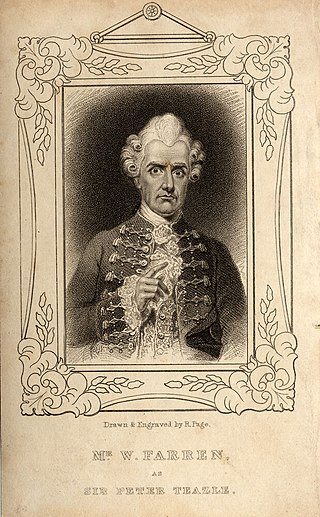Related Research Articles

Mrs Rock or Mrs Edward Anthony Rock or Miss Essex was a British actor who died in 1779 or some time after. She played at the best theatres in London in minor roles. Her reviews record her poor acting, but there is a portrait of her in the Garrick Club.
William Hamilton was an Irish stage actor of the eighteenth century.
John Sowdon was an Irish stage actor, singer and theater manager in the eighteenth century.
James Rosco was a British stage actor. His name is also written as James Roscoe.
Walter Aston (c.1706–1739) was a British stage actor of the eighteenth century.
Charles Hulett (c.1700-1735) was a British stage actor. His name is sometimes written as Charles Hulet.
John Roberts was a British stage actor of the eighteenth century.
John Cushing (1719-1790) was a British stage actor.

George Mattocks (1735–1804) was a British stage actor and singer.
Richard Cross was a British stage actor.
Luke Sparks (1711–1768) was an Irish stage actor of the eighteenth century.
![<span class="mw-page-title-main">Margaret Cuyler</span> Cuyler [married name Rice], Margaret (1758–1814), actress and courtesan](https://upload.wikimedia.org/wikipedia/commons/thumb/7/7a/Troilus-and-cressida-mrs.margaret-cuyler-1758_-1814-as-cressida-2274.jpg/320px-Troilus-and-cressida-mrs.margaret-cuyler-1758_-1814-as-cressida-2274.jpg)
Margaret Cuyler became Margaret Rice was a British actress and courtesan.

William Claremont was a British stage actor who spent many years in the companies of the leading London theatres at Covent Garden, Haymarket and Drury Lane. He was born William Cleaver in London as the son of a shop assistant and a deliveryman and was originally apprenticed to a linen merchant. His first known acting roles were in Margate in 1792 and from 1793 he was a regular at Covent Garden. During the summers he also appeared at Richmond and Birmingham. He continued at Covent Garden until 1805 when he switched to Drury Lane and remained there until 1822.
Edward Evans Townsend (1766–1809) was a Welsh stage actor and singer. After making his reputation as a touring actor in Yorkshire, notably at Hull under the management of Tate Wilkinson, he was at the Theatre Royal, Norwich in the early 1790s. He also appeared in Ireland at the Crow Street Theatre and the Theatre Royal, Cork.
Astley Bransby was an English stage actor and theatre manager who was a long-standing member of the company of the Theatre Royal, Drury Lane under David Garrick. His first known performance was Captain Plume in George Farquhar's The Recruiting Officer in 1744 at the Haymarket where he was part of a group of young actors being trained by Charles Macklin. The following year he made his first appearance at Drury Lane and remained there for three decades, with the expection of a four-year spell at the Theatre Royal, Covent Garden from 1749 to 1753. He played a vast number of supporting roles in the repertory as well as occasionally originating new roles. He retired from thestage in 1777 from ill health. He was a co-manager of Richmond Theatre.
Thomas Robson (1737–1813) was a British stage actor and singer. Born as Thomas Robson Brownhill in Hull in 1737, he began his career in provincial theatre appearing in Norwich in the late 1760s. In 1769 he was at the Richmond Theatre and the following year made his London debut at the Theatre Royal, Haymarket then under the management of Samuel Foote. He originated roles of several of Foote's new farces, and also appeared the Orchard Street Theatre in Bath and the Smock Alley Theatre in Dublin over the next few years. In 1776 he joined the company of the Theatre Royal, Covent Garden and remained there until 1782, appearing in over a hundred roles. His last known roles in London were at the Haymarket in 1784.

Charlotte Jane Chapman (1762–1805) was an American-born British stage actress. Her father was ruined was during the American War of Independence and sent his daughter to live with relatives in England. Her early roles on stage came in York, where she married an actor named Morton and briefly acted under that name before separating from him and returning to her maid name. She appeared at the Theatre Royal, Margate in the summer of 1788 and was then hired by the manager Thomas Harris to joined the company of the Theatre Royal, Covent Garden in London. She remained with the company until 1804, becoming a major member of troupe known generally for her roles in comedies. She interspersed this with summer appearances at other theates including in Margate, Ireland and the Haymarket. She was buried at St Paul's in Covent Garden, known for its association with actor. She was painted twice by the artist Samuel De Wilde.

William Farren (1754–1795) was an English stage actor of the eighteenth century. He was born in London to a chandler from Clerkenwell. He made his debut at the Theatre Royal, Drury Lane in London in 1775, likely due to the influence of the actor Richard Yates and remained there until 1784 when he transferred to the rival Theatre Royal, Covent Garden. A notable early role at Drury Lane was the original Careless in Sheridan's The School for Scandal. He remained at Covent Garden until his death in 1795, making occasional summer appearances at the Haymarket. He played a mixture of supporting roles and occasional leads, and developed a reputation as a versatile actor who could appear in comedy and tragedy. He died of pneumonia and was buried at St Paul's Church in Covent Garden. His son William Farren also became an actor, and the father is sometimes known as William Farren the Elder to distinguish him.
Ursula Agnes Booth (1740–1803) was a British stage actress of the eighteenth century. She first appeared at the Theatre Royal, Covent Garden in London on 1 November 1775, but at the season switched to the rival Theatre Royal, Drury Lane and remained a part of the company for the next twenty years under the management of Richard Brinsley Sheridan. She specialised in character roles of older woman. She also appeared in the summers at the Haymarket. Her husband John Booth was the resident tailor at Drury Lane. She was the mother of the actress Elizabeth Field who married the actor William Wallack and was therefore the grandmother of James William Wallack and Henry John Wallack.

Robert Benson (1765–1796) was an English stage actor of the eighteenth century. The son of two actors, he made his first London appearance at the Theatre Royal, Haymarket in 1778 as a child actor playing the Duke of York in Richard III and acted occasionally at the Theatre Royal, Drury Lane over the following years. After an absence of some time, he returned to Drury Lane in November 1786 having now graduated to adult roles. He became a reliable member of the company known for his character roles as comic eccentrics and smooth young gentleman. For the summer of 1791 he took over the management of Richmond Theatre with James Thompson and William Macready. He also acted at Haymarket during the summers and authored an operatic farce Britain's Glory which premiered there in 1795. In 1783 he married the actress Susanna Satchell (1758–1814), the sister of Elizabeth Satchell.